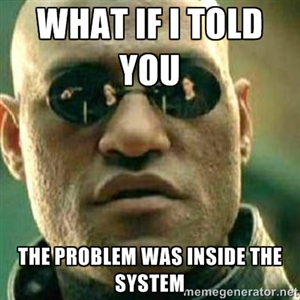To be an atheist, one must deny the existence of God, any God. When pressed as to why they don’t believe in God, any god, not even the ones that allow them to throw crazy parties, ie Bacchus, many atheists reply that they don’t believe in God because there is no scientific evidence to prove that there is such a thing as God. And thus, whether he knows it or not, the atheist has killed science.
Perhaps I should back up a little. First of all I should explain that this particular brand of atheists also tend to refer to themselves as Empiricists. And if they don’t refer to themselves as such, I believe that they ought to. The empiricist holds that nothing which cannot be demonstrated to them, that is to say, nothing which cannot be scientifically proven, is true. And there you have it, nice and neat, there is no proof that there is God, and thus there is no God. But what else might one cut out of the picture by claiming, and holding to, empiricism as the basis of all knowledge?
For an answer to this we have to look to perhaps the most famous of all empiricists, Scottish Enlightenment philosopher and proto-troll, David Hume.
The first of Hume’s explanations that needs to be addressed is his theory of man’s interaction with reality, since that’s what’s being discussed here. Hume’s theory of human understanding of reality is called “Bundle Theory.” Bundle Theory relies on the empiricist dogma that nothing which cannot be demonstrated can be believed and explains to us that there is no “thing-in-itself,” a fixed metaphysical reality or driving purpose, there is only a bundle of attributes (thus the term Bundle Theory). To prove this, Hume challenges anyone to think of an apple, without thinking about the attributes of an apple. Can’t do it, can yah? Well, there you have it, if we can only know empirically, then there is no thing-in-itself, there are just attributes. But, if this is true, then there’s no such thing as friendship, love, or anything else that isn’t physically or mathematically demonstrable. This is something that almost no one (aside from a few very honest and depressed denizens of the internet, most of whom are convinced that we are all living in a computer simulation), would agree to. But all proof of these things boils down to emotion, inclination, or intuition, none of which constitutes empirical, and thus scientific validity.
Thought Experiment:
You are an empiricist, and have a degree in robotics and computer programming. Your family sucks. Your father’s an alcoholic, your mother’s passive aggressive and has never approved of anything you’ve done with your life. Your spouse has fallen out of love with you, grown cold and distant, and is probably cheating on you. You discover a way to create very complicated and lifelike simulations of human behavior, as well as robots who would look, sound and move like people.
Do you break ties with your family and replace them with robots who do a better job?
But, back to science!
Hume also relates to us that since we there are no things-in-themselves there is also no direct knowledge of causation. Instead, we see patterns. I drop the ball and see that it falls; after doing this enough times I become convinced that the ball will always drop. This however brings us back to the classic problem of Induction. The problem of induction is that there is no way of proving, empirically, that an event will always happen. If you have only ever seen green apples, and thus conclude that apples are always green, you’ll be pretty shaken up when someone hands you a red apple. And so, induction, or concluding that things viewed are always going to be that way, is against the most basic tenant of empiricism, that we can only know what is demonstrated to us. However this, the belief that we can indeed know things for certain, is the foundation of science. As such, the empiricist cannot allow science. And if he does than he is not abiding by his own logic. This is how Hume dealt with the problem, to ignore the problem, and simply play a lot of cards.














